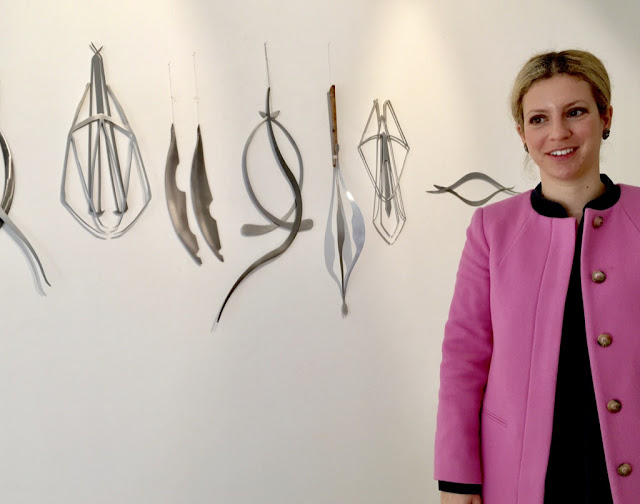Photograph by Enrico Fiorese –
courtesy Alma Zevi
Alma Zevi
Miriam Austin -
Andraste
Miriam Austin’s exhibition at Alma
Zevi is named Andraste after the Celtic war goddess, until April 28. It is the
first exhibition in Italy for the London based New Zealand-er for which she has
produced new works including collages and aluminum sculptures which explore the
relationship between ritual, myth, ecological fragility, and the politics of
the body.
Photograph by Enrico Fiorese –
courtesy Alma Zevi
Miriam Austin -
Andraste
For her exhibition Austin further
developed her ongoing sculptural series Tools. These steel and aluminum sculptures
have been carefully arranged by the artist as a site-specific installation for
the gallery. The objects are self-referential, but have also been used for
performances that are choreographed by the artist. With undertones of Austin’s
interest in folklore, magical rites and rituals, the works are also
intrinsically linked to a British landscape through the exhibition title,
Andraste. This is a homage to the war goddess of the same name, who was invoked
by Boudica in her fight against the Roman occupation in Britain in AD 60.
Photograph courtesy Alma Zevi
Miriam Austin
Photograph by Enrico Fiorese –
courtesy Alma Zevi
Miriam Austin –
Andraste
Austin has created entirely new collages, printing on silk for the first
time. With the collages’ titles rich in associations’ - Ritual for the Sterile Seed and Lotus - Austin introduces the viewer to another facet
of her work. Here she uses computer programs, in a pseudo-rudimentary way,
creating imagery that combines contemporary and ancient symbols. The layering of meaning in these pieces is
inextricable from the physical layering of visual references. The backgrounds
of the collages recall the texture of skin, but are in fact taken from aerial
photographs of a series of coral atols and reefs. This confrontation between
micro and macro, and the suggestion of the endless repetitions found in nature,
is intrinsic in Austin’s work. And, as in her
sculptural work, she creates a disconnected sensation, engaging ancient and
modern, but with no suggested bridging point between the two.
Alma Zevi
Miriam Austin –
Andraste
In all of Austin’s work shown in Venice,
she offers the viewer a new perspective on the binaries of the natural and the
unnatural, the sacred and the profane. This narrative aims to situate such
oppositions within our contemporary life. Venice, with its complex
socio-political and ecological current situation, seems an apt setting for the
artist’s investigation into our relationships with history, industry, and
artifice.






